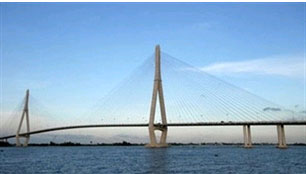Vietnam uses Japanese ODA effectively
Can Tho Bridge is the biggest suspension one in Southeast Asia built with Japanese official development assistance.
Motonori Tsuno, chief representative of the Japan International Cooperation Agency (JICA) in Vietnam told a VOV reporter on June 15 that Japan considers Vietnam as its important and strategic partner in Southeast Asia. For the benefit of development and stability in Japan and the region as a whole, Japan is keen to further help Vietnam with ODA. JICA has signed an agreement with the Ministry of Finance to provide US$500 million in loan to build two expressway sessions: Ho Chi Minh-Dau Giay and Da Nang-Quang Ngai.

Reporter: Vietnam has become a middle income country and many donors plan to cut ODA for Vietnam. Why will Japan continue to help Vietnam?
Mr Tsuno: After the earthquake and tsunami, Japan faces a number of difficulties in its national reconstruction. However, the Japanese Government has decided further help Vietnam for the benefit of long-term strategic partnership between the two countries. 2010 marked the initial stage of Vietnam becoming a middle income country.
Anyway, Vietnam still has to do a lot of work, including building technical infrastructure, especially transport system to attract foreign investors and improving competitive skills to catch up with some regional countries. Therefore, Japan will continue to support Vietnam in completing institutions and policies and strengthening public-private partnership in infrastructure development.
Reporter: What is Vietnam’s position among recipients of Japanese ODA?
Mr Tsumo: Vietnam is second, only to India among 100 recipients of Japanese ODA. Japan provides India with around US$2 billion a year for railway and electric power projects. However, India’s population is much bigger than Vietnam’s. So it can be said that Vietnam tops the list of recipients in terms of per head calculation.
Reporter: What’s your evaluation of Vietnam’s ODA efficiency?
Mr Tsuno: Since Japan offered ODA to Vietnam in 1992 many transport, power, environment and rural development projects have been completed with better results than expected. In addition to providing capital for infrastructure construction we also cooperate with Vietnam in human resource training and institutional and policy improvement.
For Vietnam, our loans come with technical support to create high efficiency. Providing ODA for Vietnam in the wake of natural disasters demonstrates that the strategic partnership between the two countries is becoming ever closer.
In short, the Vietnamese Government has used ODA funding to full advantage.
Reporter: People said that Vietnam’s debt is huge. As a big donor for Vietnam, does Japan have any worries about the country’s ability to pay debt?
Mr Tsuno: Judging from Vietnam’s economic growth its debt is not much. Such assessment is not from our country but also from other donors like the World Bank and Asian Development Bank. We are confident of the Vietnamese Government’s ability to pay debt and will continue to provide Vietnam with loans.
On the other hand, the Vietnamese Government has made every effort to contain inflation, stabilise macroeconomy and ensure social welfare. I believe that such policies will come to fruition through the effective use of ODA.
Reporter: Thank you very much.

